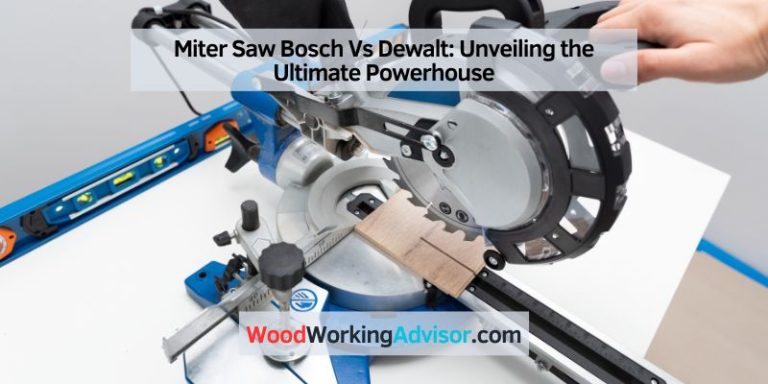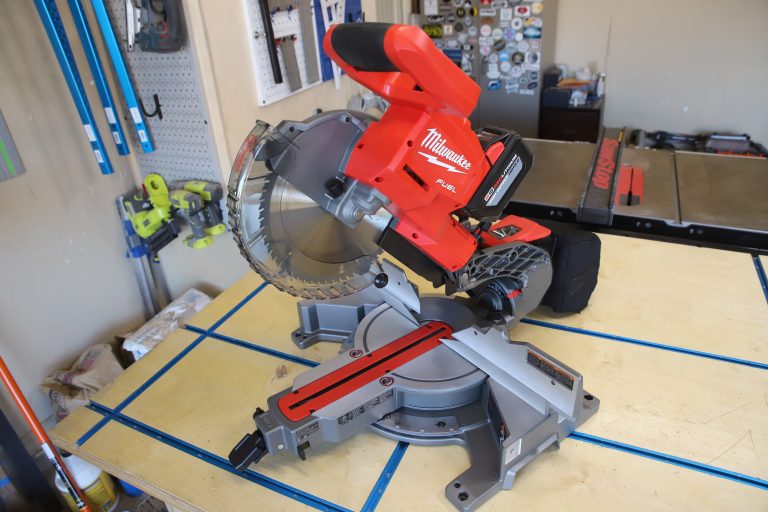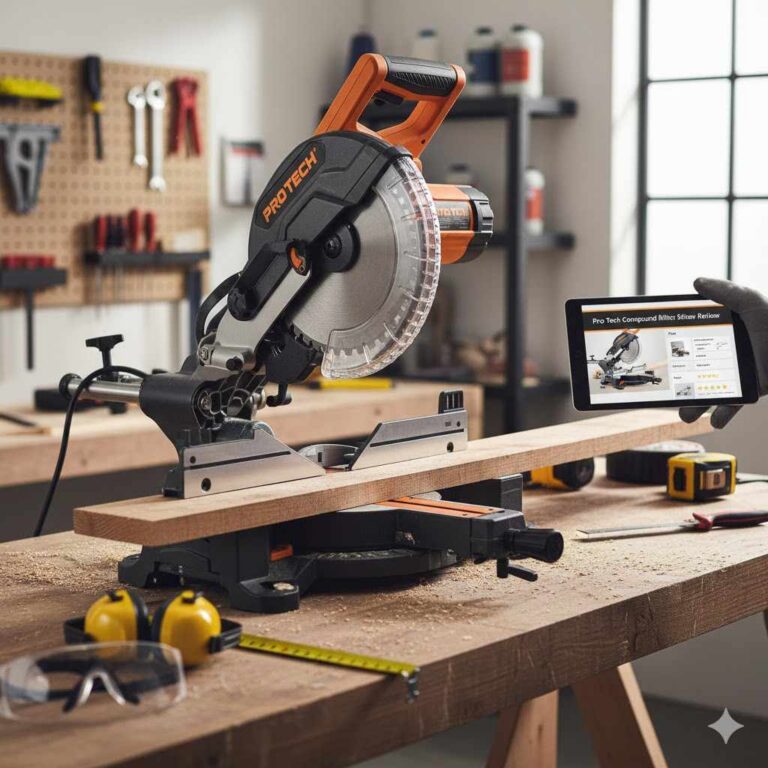How to Store Miter Saw: Secure & Space-Saving Tips
To store a miter saw, clean it thoroughly and keep it in a dry, dust-free area. Use a protective cover to prevent damage and dust accumulation.
Miter saws are essential tools for precise cutting in woodworking and construction projects. Proper storage is crucial to maintain their functionality and lifespan. Many users overlook the importance of a dedicated storage space, leading to wear and tear. A well-stored miter saw not only remains in optimal condition but also ensures safety in your workspace.
Whether you have a permanent workshop or a temporary setup, knowing how to store your miter saw can save you time and money. This guide will provide practical tips for effective miter saw storage, ensuring your tool stays reliable and ready for your next project.
Introduction To Miter Saw Storage
Proper storage of a miter saw is very important. It helps keep the tool safe and ready to use. A well-stored saw lasts longer and works better. Dust, moisture, and accidents can damage your miter saw.
Challenges can arise when storing power tools. Finding enough space is often a problem. Tools can get rusty if not stored properly. A cluttered area can lead to accidents and injuries. Keeping everything organized is key.
| Storage Challenge | Solution |
|---|---|
| Limited Space | Use wall mounts or tool cabinets. |
| Dust Accumulation | Cover the saw when not in use. |
| Moisture Damage | Store in a dry area. |
| Accidental Damage | Keep tools in a designated spot. |
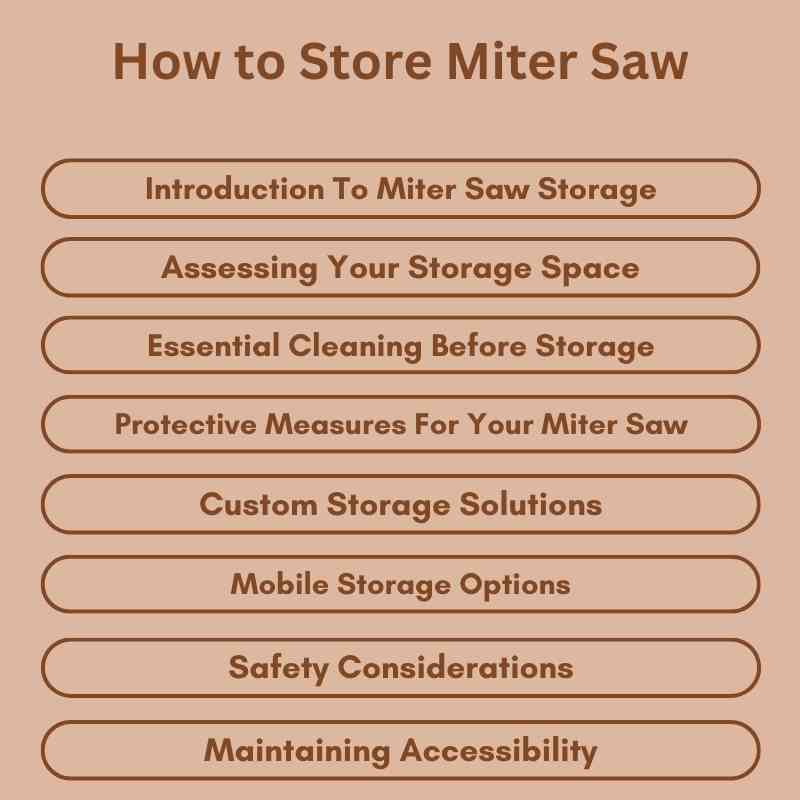
Assessing Your Storage Space
Start by measuring your workshop area. Ensure there is enough space for your miter saw and other tools. Look for a spot that is easy to access. Keep the area clean and organized for safety.
Utilizing vertical space can save valuable floor area. Use shelves or pegboards to store accessories. Hang your miter saw on a wall mount if possible. This keeps it out of the way while remaining accessible.
Consider building a tool cabinet for extra storage. This can hold your miter saw and other equipment. Ensure the cabinet is sturdy and can support the saw’s weight.
Essential Cleaning Before Storage
Cleaning your miter saw is very important. Start by removing sawdust and debris. Use a brush or vacuum to clean all surfaces. Pay attention to the blade and base for hidden dust. This keeps your saw working well.
Next, apply lubrication to essential parts. Use a light oil for the pivot points and rails. This helps prevent rust and keeps everything moving smoothly. Regular maintenance increases the saw’s longevity. Take care of your tools, and they will last longer.
Protective Measures For Your Miter Saw
Using covers is essential for protecting your miter saw. A good cover can help prevent rust. Choose a cover made of breathable material. This will allow moisture to escape.
Avoiding moisture is key to keeping your miter saw safe. Store the saw in a dry place. Use desiccants to absorb any moisture in the air.
Extreme temperatures can harm your miter saw. Avoid storing it in places that get too hot or too cold. A stable temperature helps maintain the saw’s condition.
Custom Storage Solutions
Creating a custom storage solution for your miter saw is essential. A miter saw station helps keep your workspace organized. Use sturdy materials for the station to ensure durability. Consider adding shelves for storing tools and materials.
Wall mounts and brackets save space. They keep the saw off the ground. Choose mounts that securely hold the saw in place. Ensure the brackets are heavy-duty for safety.
| Storage Option | Benefits |
|---|---|
| Miter Saw Station | Organized workspace and easy access |
| Wall Mounts | Saves floor space and provides safety |
| Brackets | Securely holds tools and materials |
Mobile Storage Options
Rolling stands offer great mobility for storing miter saws. They are easy to move around job sites. This flexibility saves time and effort. Sturdy wheels ensure stability while transporting. Most stands have adjustable heights for user comfort.
Portable cases are perfect for contractors on the go. They protect miter saws from damage during transport. Lightweight designs make lifting easy. Many cases have extra compartments for blades and accessories. This keeps everything organized and accessible.
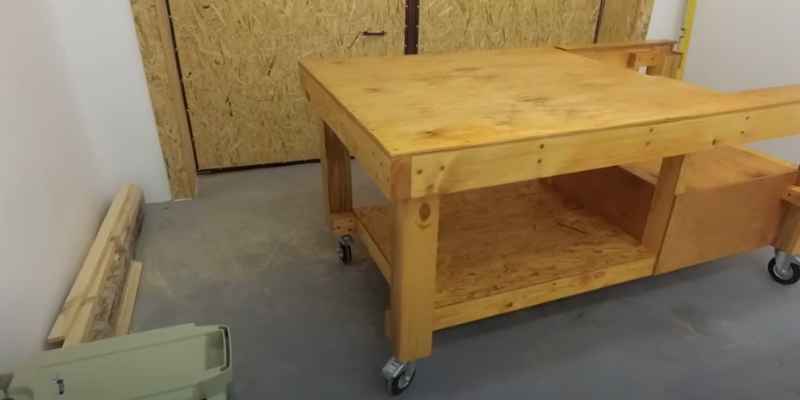
Safety Considerations
Always secure your miter saw during transport. Use straps or bungee cords to keep it in place. This helps prevent accidents and damage.
Store your saw in a designated area. Make sure it is childproof. Lock it away from curious hands. Use a cabinet or safety latch for extra security.
Keep the area clean and organized. Avoid clutter around your saw. This minimizes the risk of injury and makes it easier to find tools.
Maintaining Accessibility
To maintain accessibility, keep your miter saw in a clear space. Organizing your workspace helps you find tools quickly. Use storage bins for blades and accessories. Label each bin for easy identification.
For quick setup and breakdown, use a rolling cart to move the saw. This saves time when starting projects. Ensure all cords are neatly stored to prevent tripping. Regularly check for any damages to the saw and its accessories.
Follow these tips to keep everything efficient and safe. A well-organized space boosts productivity and ensures a smooth workflow.
Innovative Storage Accessories
Using pegboards and hooks is a smart way to organize your miter saw. They save space and keep tools visible. Hang the saw and accessories on the board. This makes it easy to grab what you need.
Magnetic holders work great for storing blades and small parts. They keep items secure and easily accessible. Place the holders on a wall or tool chest. This helps avoid losing important accessories.
| Storage Method | Benefits |
|---|---|
| Pegboards | Maximize space and visibility |
| Hooks | Easy access to tools |
| Magnetic Holders | Secure storage for blades |
Seasonal Storage Tips
Before storing your miter saw for a long time, clean it well. Remove any dust and debris. Check the blade for sharpness and replace it if necessary. Make sure all parts are in good condition.
Store your saw in a dry and cool place. This helps prevent rust and damage. Use a protective cover to shield it from dust and moisture.
Routine checks are important during downtime. Inspect the saw every few months. Look for any signs of wear or damage. Lubricate moving parts to keep everything running smoothly.
Keep the saw’s manual handy. This will help with any repairs or maintenance needed. Always prioritize safety when handling tools.
Frequently Asked Questions
How Do I Properly Store My Miter Saw?
To properly store your miter saw, first clean it to remove dust and debris. Then, unplug it and secure the blade. Store it in a dry, cool area, preferably in a dedicated storage case or on a shelf. Avoid exposure to moisture to prevent rusting and damage.
Can I Leave My Miter Saw Outside?
Leaving your miter saw outside is not advisable. Exposure to the elements can lead to rust, damage, and decreased performance. If you must store it outside, ensure it’s protected by a waterproof cover and stored on a raised platform to avoid moisture accumulation.
What Is The Best Way To Maintain A Miter Saw?
Regular maintenance includes cleaning, checking the blade, and lubricating moving parts. Inspect for any loose screws or damaged components. Ensure the saw is calibrated for accurate cuts. Regularly replace worn blades for optimal performance and longevity of the tool.
Should I Use A Miter Saw Stand?
Using a miter saw stand is highly recommended. It provides stability and supports larger workpieces, enhancing safety and precision. A stand often includes features like height adjustment and mobility, making your work process more efficient and comfortable.
Conclusion
Properly storing your miter saw is essential for its longevity and performance. Use a dedicated space to keep it safe from dust and damage. Invest in a sturdy storage solution to prevent accidents. Regular maintenance, along with proper storage, ensures your saw remains in top condition for all your projects.


